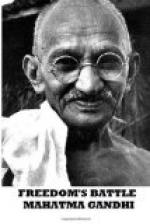Babu Janakdhari Prasad was a staunch coworker with me in Champaran. He has written a long letter setting forth his reasons for his belief that India has a great mission before her, and that she can achieve her purpose only by non-violent non-co-operation. But he has doubts which he would have me answer publicly. The letter being long, I am withholding. But the doubts are entitled to respect and I must endeavour to answer them. Here they are us framed by Bubu Janakdhari Prasad.
(a) Is not the non-co-operation movement creating a sort of race-hatred between Englishmen and Indians, and is it in accordance with the Divine plan of universal love and brotherhood?
(b) Does not the use of words “devilish,” “satanic,” etc., savour of unbrotherly sentiment and incite feelings of hatred?
(c) Should not the non-co-operation movement be conducted on strictly non-violent and non-emotional lines both in speech and action?
(d) Is there no danger of the movement going out of control and lending to violence?
As to (a), I must say that the movement is not ‘creating’ race-hatred. It certainly gives, as I have already said, disciplined expression to it. You cannot eradicate evil by ignoring it. It is because I want to promote universal brotherhood that I have taken up non-co-operation so that, by self-purification, India may make the world better than it is.
As to (b), I know that the words ‘satanic’ and ‘devilish’ are strong, but they relate the exact truth. They describe a system not persons: We are bound to hate evil, if we would shun it. But by means of non-co-operation we are able to distinguish between the evil and the evil-doer. I have found no difficulty in describing a particular activity of a brother of mine to be devilish, but I am not aware of having harboured any hatred about him. Non-co-operation teaches us to love our fellowmen in spite of their faults, not by ignoring or over-looking them.
As to (c), the movement is certainly being conducted on strictly non-violent lines. That all non-co-operators have not yet thoroughly imbibed the doctrine is true. But that just shows what an evil legacy we have inherited. Emotion there is in the movement. And it will remain. A man without emotion is a man without feeling.
As to (d), there certainly is danger of the movement becoming violent. But we may no more drop non-violent non-co-operation because of its dangers, than we may stop freedom because of the danger of its abuse.
REJOINDER
Messrs. Popley and Philips have been good enough to reply to my letter “To Every Englishman in India.” I recognise and appreciate the friendly spirit of their letter. But I see that there are fundamental differences which must for the time being divide them and me. So long as I felt that, in spite of grievous lapses the British Empire represented an activity for the worlds and India’s good, I clung to it like a child to its mother’s breast. But that faith is gone. The British nation has endorsed the Punjab and Khilsfat crimes. The is no doubt a dissenting minority. But a dissenting minority that satisfies itself with a mere expression of its opinion and continues to help the wrong-doer partakes in wrong-doing.




